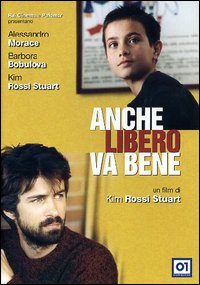
ANCHE LIBERA VA BENE
Italy, 2006, 113 minutes, Colour.
Kim Rossi Stuart, Alexander Morace.
Directed by Kim Rossi Stuart.
There is a long tradition of Italian film-makers directing insightful films about children. One thinks of the pathos of De Sica’s Shoeshine and Bicycle Thieves. More recently, Kim Rossi Stuart starred in a fine film about a handicapped child and care, The Keys of the House. That experience must have emboldened him to take on the task of co-writing, directing and acting the role of the father in this film.
It is a slice of life, very well-written and acted, a glimpse of two young children, especially an 11 year old boy, dealing with the tensions in a home where the mother has walked out several times, returns promising never to leave again. But the little boy knows she will not stay. The father is a temperamental photographer, loving his children but so stressed that he flares up at the least provocation.
A very telling performance has been coaxed out of Alessandro Morace as Tommasso, the introspective, sensible young boy. We share his joys, his bewilderment at the behaviour of his parents and his pain, especially when his angry father hussles him out of the house. He has one of those faces which is not only expressive even when he is not speaking but a face which invites the audience to like him, to sympathise with him and to try to understand him. Marta Nobilil is also very good as the older daughter who is devoted to her mother and can scarcely contain her happiness when her mother returns. Barbora Bobulova has the difficult role of a mother who is insecure, does love her children and even her husband but who cannot settle.
Kim Rossi Stuart shows great sensitivity in his direction as well as in the sequences with his children.
Not that there is anything particularly new in this glimpse of parents and children and their difficulties. However, it is so well done that audiences will value seeing it and thinking about it.
1.The impact of the drama, family, parenting, children?
2.The Italian town, homes and apartments, school, the baths, the film locations, the lake and fishing? Authentic and credible? The musical score?
3.The title, freedom – and the ironies of the title? The characters and their freedoms?
4.The focus on Tomasso, audiences identifying with him, the boy actor and his performance, his face, expression, introspective? Communication? At home, waking up, his room, his relationship with Viola? The jokes, getting ready for school? At school, flirting with the girl at the pottery class, putting the note in her bag, later denying it? His friendship with Antonio, going home with him? The mute boy and his being with him? The absent mother at home? His reserve on her return, knowing she would leave, yet happy with her presence, the outings, her taking him from school? His seeing that there were no lights on in the house when they returned? His love for his father, his father’s care for him, the father and his demands, cleaning the room, cleaning up? His skill at swimming, seeing his success? His wanting to play football? The father and the mother’s return, the round table decision about her coming back? The outing to the film set, going to the beach, the hotel? His father and his anger? Antonio’s home, going fishing with Antonio’s father, the offer to go skiing, his father’s angry response, ousting him from the house? His mother’s photo? On the bus at the end? His future? A well-rounded character?
5.The portrait of the father, his age, caring for his children, getting them to school, his temper at their not cleaning up, watching his son swimming, the tantrum about work and money, his carry-on on the set, his wife’s return, anger with her, the family decision, happy, the outing to the hotel, her going away again, his care for Viola, care for Tomasso, anger about the ski request, sending him out of the house, the reconciliation – and the promise that he would play football?
6.Viola, her life in the house, relationship to Tomasso, love for her father, her excitement at her mother’s return?
7.The mother, the lack of explanation of why she went away, instability, ill, no sense of responsibility, the return, the family decision, her promises, cooking the meals, the film set outing, the hotel, love for her husband, taking Tomasso out of school, the day out, her disappearance?
8.Livia, friendship with the mother the phone calls, the outing, the friend? The wealthy friend?
9.Antonio and his family, happy, the massage for his mother, taking Tomasso home, playing the games, going fishing, the possibility of the ski outing?
10.The mute boy, the girl flirting, the teacher and her concern?
11.A focus on real people, real situations?